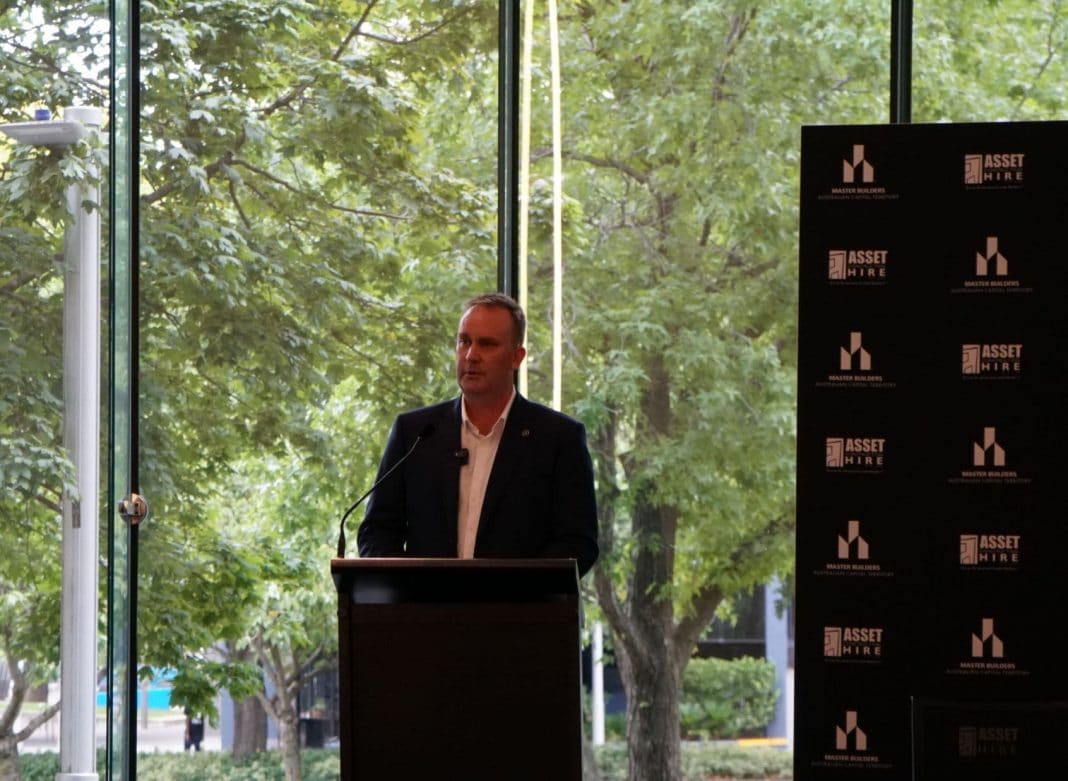Construction in the ACT resumed a fortnight ago after a month-long hiatus, but the industry relies on interstate workers, many of whom cannot enter the ACT, to complete projects.
As a result, total employment in the ACT construction industry fell to the second lowest level in three years, while the value of building jobs increased 20 per cent since mid-2020, according to ABS employment data released this week.
Employment in the ACT’s building and construction sector fell by almost a quarter, from 20,025 in May 2020 to 18,459 in May 2021 and then to 15,331 in August, before the ACT lockdown began but while travel restrictions were in place from NSW. The total value of building works hit $676m in June 2021, leading to a 12-month average of close to $250m.
“These figures mean the local industry is building 20 per cent more with 25 per cent less workforce compared to just over a year ago,” said Master Builders ACT CEO Michael Hopkins.
Many workers live outside the ACT, Mr Hopkins said: some in one of the 10 border postcodes whose residents can enter, but many live in Cooma or Yass, and cannot visit the ACT at the moment. As the ACT grows and some public infrastructure gets larger and more complex, he said, construction industries have come to rely on specialist trades which come from Sydney or Melbourne, or further afield.
“[The lockdown] is having an impact on quite a number of projects which are midway through construction,” Mr Hopkins said.
“Because we needed to go into lockdown at such short notice, construction projects, like other businesses, stopped very quickly, and those workers or those companies that were midway through a project have commonly left the ACT and returned home. And now the industry has been able to recommence, we’re having trouble getting those companies and those workers back, if they originate from outside the 10 postcodes area.”
The MBA is advocating for the ACT Government to permit travel exemptions from beyond the ACT and 10 postcode area for critical trades and essential construction workers.
Mr Hopkins believes that as part of the ACT roadmap out of lockdown, essential workers in low-risk NSW postcodes or local government areas should be able to enter the ACT, subject to advice from the Chief Health Officer.
“That will certainly allow those workers who used to regularly work in the ACT to recommence their jobs, and to finish a number of those larger projects which are not able to be completed at the moment because they’re relying on the trade or the subcontractor to return from interstate.”
The lockdown would have a devastating impact on all small local businesses, Mr Hopkins predicted, including construction companies. The construction industry makes up a significant proportion of the ACT’s economy – every dollar invested in construction has a three-dollar multiplier impact – but it comprises at least 98 per cent small businesses.
“Small businesses are going to be the most impacted by lockdown, because they are generally less likely to have large cash reserves, and less likely to be able to afford to not have any income for three or four weeks during lockdown,” Mr Hopkins said.
The MBA is advocating for financial support for local businesses. It has encouraged its ACT-based members to access the ACT Government’s business support payments, but Mr Hopkins hoped the government would introduce non-financial supports to support the industry’s recovery, such as fast-tracking development approvals and the unit titling stage of a project (the final step before an apartment or townhouse project is completed, permitting the units to be settled). “Speeding up that process would help the cashflow of a local builder or developer,” he said.
They would also like the government to defer or waive rates, charges, and taxes, and hoped not to see significant increases on existing taxes, fees, and charges.
The MBA is also seeking cost recovery for lockdown expenses and the costs of implementing the Construction Requirements; materials have become significantly more expensive over this time, Mr Hopkins said.
“Particularly for ACT government projects, where the ACT government is the client, we would hope that they would be understanding of the claims by contractors to deal with extensions of time due to the lockdown or increased costs,” Mr Hopkins said. “And we hope that the ACT Government as a model client would work with local contractors to help them work through all the various impacts of the lockdown on public infrastructure projects.”
But although the building sector has been shaken, Mr Hopkins said that the industry is also resilient. Last year, it led the ACT economic recovery, and he believes it can do so again.
“We would hope that with appropriate support from the government, our local industry is able to work through the impacts of lockdown … get back up on its feet as quickly as possible, and then actually helps the government recover the ACT economy.”
Until then, he said, MBA members were happy to work again. “We’re focused, as are they, on complying with the ACT construction requirements, and making sure that they recommence their projects in a safe way.”
However, Mr Hopkins said, workforce limitations meant productivity was low, leading to project delays and price rises.
“Our message to anyone having a home built or renovated at the moment, is to be patient, to speak with their builder about the impacts of time delays and cost increases, and work with them to make to make sure that their projects can be completed as quickly and as safely as possible.”
Get all the latest Canberra news, sport, entertainment, lifestyle, competitions and more delivered straight to your inbox with the Canberra Daily Daily Newsletter. Sign up here.



